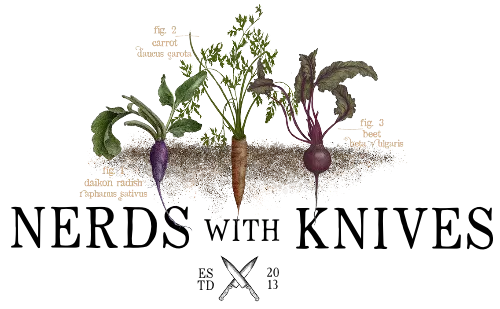
Let’s get this out of the way upfront: there’s a meat-and-fruit tradition in cooking that we’re just not a hundred percent on board with. There’s nothing intrinsically wrong with that kind of combination, but the problem occurs when the fruit is overly sweet and there’s nothing to balance it out. When you have a fatty cut of meat — such as lamb — or fish, such as the wild salmon we use here — it benefits from being cut with an acidic component. It’s the same reason we use oil and vinegar together in a salad dressing.
We’ll often use lemon in our dishes to contribute that balance, but this week we’re looking at how pomegranate molasses, made into a pomegranate glaze, can lend a similar complexity to the rich flavor of roasted salmon.

We’ve all got that ingredient somewhere in the pantry. It’s the jar of something you picked up at the store, maybe on a whim or maybe with a specific purpose in mind, but then it got forgotten and languished in your kitchen cupboard until you re-discovered it and thought “aha! I know what to do with that”. Pantry space is not infinite (we can’t all have a TARDIS) and there’s a limit to how many items we can store that we aren’t using on a regular basis. For us, this ingredient is pomegranate molasses.
Pomegranate molasses, in most cases, is really just a reduction of pomegranate juice. As you can imagine, this process creates a thick, tart syrup. Most brands will add sugar to the reduction to increase sweetness, but some won’t. The particular variety we have is called Alwadi (most brands are Middle Eastern in origin), and they do add sugar. Of course you could also boil down pomegranate juice yourself, but it won’t keep as long.
I don’t remember what we originally got the molasses for (although Emily will, she has a culinary memory like a steel trap. She remembers what we’ve each eaten for practically every dinner date in our 18-year relationship. It’s annoyingly impressive) but it’s perfect as the basis for a glaze in this salmon recipe. We combine it with dijon mustard and just a touch of added sugar and vinegar. If your syrup is unsweetened, you’ll probably want to add some extra sugar, to taste.

It’s not just barbecued meat that benefits from being cooked low and slow — it can also be a fantastic approach for tender, ultra-silky fish too. The way we cook salmon most often is to marinade it in a miso sauce, and sear it in a hot pan, infusing the flesh with flavor while creating a delightfully crispy skin. But there’s more than one way to cook a fish, and here we’re taking almost the opposite approach. A very low oven temperature not only turns the salmon meltingly tender, it’s also much simpler to cook (and harder to over-cook).
First, though, we need to give the vegetables a high heat head start — a combination of thinly shaved fennel, leeks, smashed garlic cloves and lemon slices, that soften and caramelize into a melty, garlicky bed of deliciousness. It will look like a lot of vegetables but they cook down to couple of cups. The veggies get a quick blast of high heat for just a quarter of an hour, allowing them to color and caramelize a bit. Then we bring the oven temperature down to 225ºF and add the fish to the pan, to allow the pomegranate glazed salmon to roast gently.
Individually portioned fillets (6 to 8 ounces) will cook through relatively quickly (15 to 25 minuets, depending on the thickness). We splurged on a large, thick piece of wild salmon, which took closer to an hour to cook through. It’s ready when an instant-read thermometer hits 125ºF. If you don’t have a thermometer (get one, they’re awesome!), you can tell the fish is done when the edges look opaque and the thick part of the salmon flakes easily but doesn’t look dry.

We served it with big pearls of Israeli couscous, just to continue the Middle Eastern theme. It was delicious topped with the sweet vegetables and silky salmon, and drizzled with a little lemony olive oil from the bottom of the pan. A few fennel fronds add an herbal freshness, along with a beautiful hit of bright green. Now we’ve gained an appreciation for a pomegranate glaze, we’ll be making it a lot more, and we’re keen to see what else we can use the molasses for.
What’s your never-used (or surprise) pantry ingredient? Let us know in the comments!
Pomegranate Glazed Slow-Roasted Salmon with Fennel and Leeks
Ingredients
- 2 leeks cleaned well and thinly sliced
- 2 fennel bulbs cored, very thinly sliced, fronds reserved, if possible
- 5 garlic cloves peeled and smashed
- 1 lemon thinly sliced
- 2 tablespoons extra-virgin olive oil plus more for drizzling
- Kosher salt and freshly cracked black pepper to taste
- 2 tablespoons pomegranate molasses
- 1 tablespoon dijon mustard
- 1 teaspoon sugar
- 2 teaspoons red wine vinegar
- 1 1/2 lb. center cut piece salmon filet or 4 salmon filets, 6 to 8 oz each
Instructions
- Preheat oven to 425ºF and set a rack in the middle. Add the sliced leeks, fennel, garlic cloves and lemon slices to a 9 x 13-inch glass, ceramic or metal baking dish and drizzle the oil over the vegetables. Sprinkle with salt and pepper to taste, and roast for 10 to 12 minutes, until the vegetables soften and char slightly around the edges. Remove the dish from the oven and lower the temperature to 225ºF.
- While the vegetables are roasting, make the glaze. In a small bowl, stir together the pomegranate molasses, mustard, sugar, and vinegar. Season the salmon generously with salt and pepper. Lay the salmon on top of the fennel and brush the glaze over it. Drizzle a little more olive oil over the fish, if desired. Roast until the salmon is just cooked through and barely opaque in the center (about 125ºF on an instant-read thermometer). Cooking times will vary from 15 to 20 minutes for small fillets, or up to 40 to 50 minutes for a large piece. The fish is done when the edges look opaque and the thick part of the salmon flakes easily (125ºF on an instant read thermometer). If you want a darker glaze, you can pop the pan under the broiler for a few seconds. (Watch it carefully so it doesn’t burn.)
- Serve the fish with the leeks, fennel and lemon on the side or underneath, with some reserved fennel fronds as garnish.


Coincidentally, I came across and tried a similar recipe last week (I don’t suppose it’s the done thing to post links to someone else’s recipe, but I shall if you’d like me to). It used fennel, chilli, orange and lemon, and no glaze. It was delicious, converting me to both slow-roasting fish and fennel, which I was certain I didn’t like! I’ll be giving yours a go very soon – the salmon’s arriving on Monday and the pom molasses has been languishing in the pantry for over a year:-)
I discovered that leftovers freeze well in individual vacuum-sealed bags and are almost as good as freshly made when reheated sous vide at 50C – no overcooking!
Hi Elyss – Please do post the link, it sounds wonderful! Good tip on the freezing and sous-vide, too.
Hi Matt, here it is. It doesn’t pre-roast the fennel as you do which, fortunately, I decided was a mistake. I gave the fennel 10ish minutes at a higher temp before adding the rest. I used a blood orange, a regular lemon and jalapeño.
https://www.bonappetit.com/recipe/slow-roasted-salmon-with-fennel-citrus-and-chiles